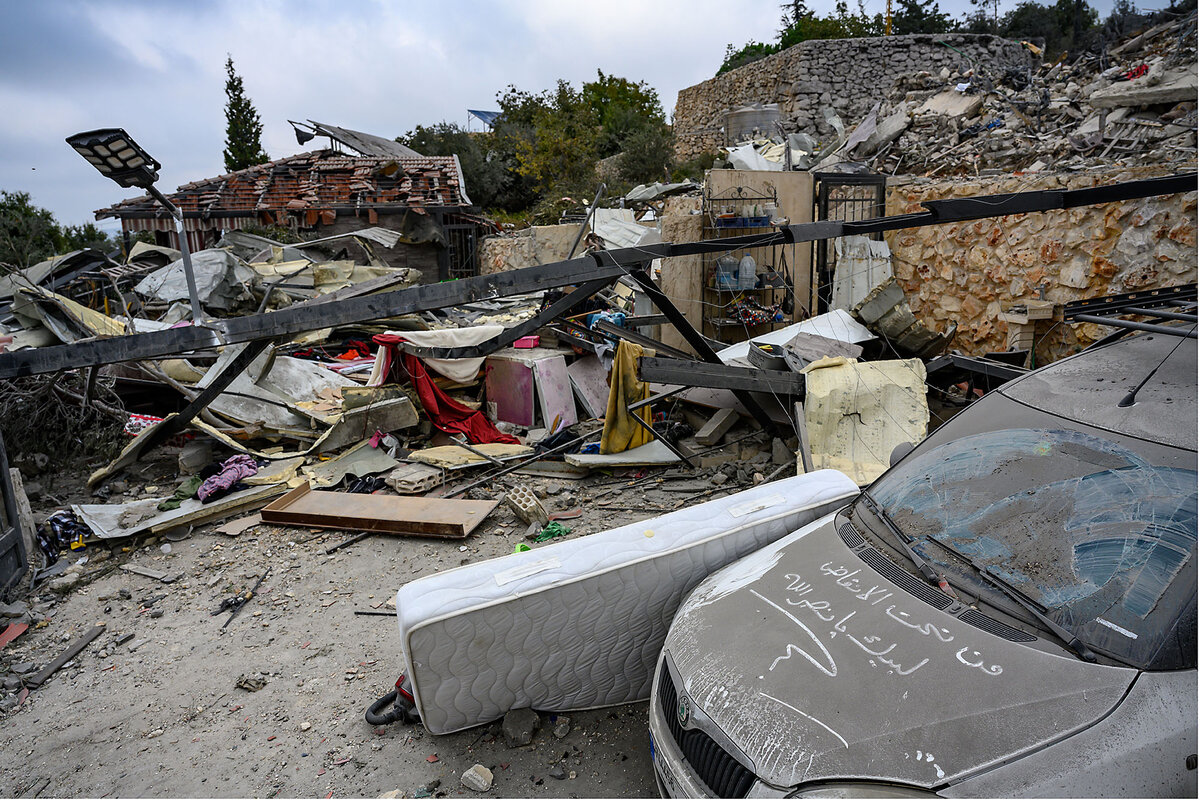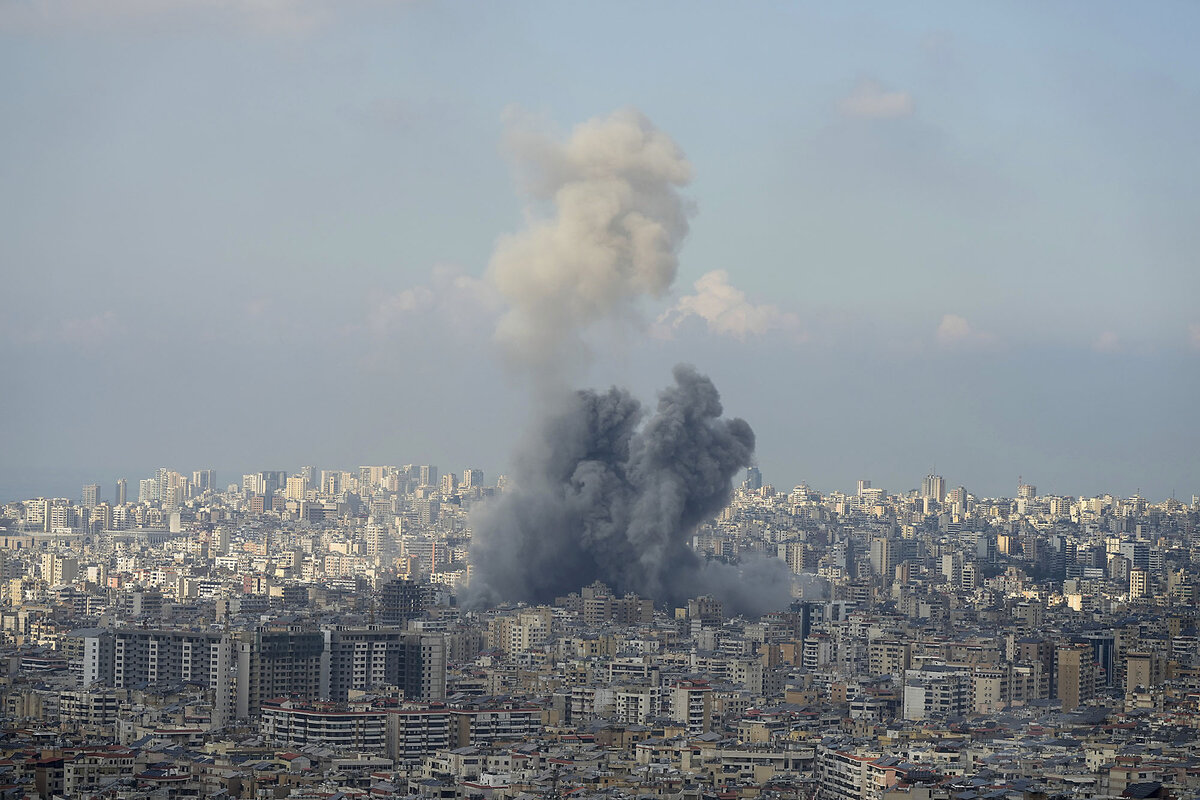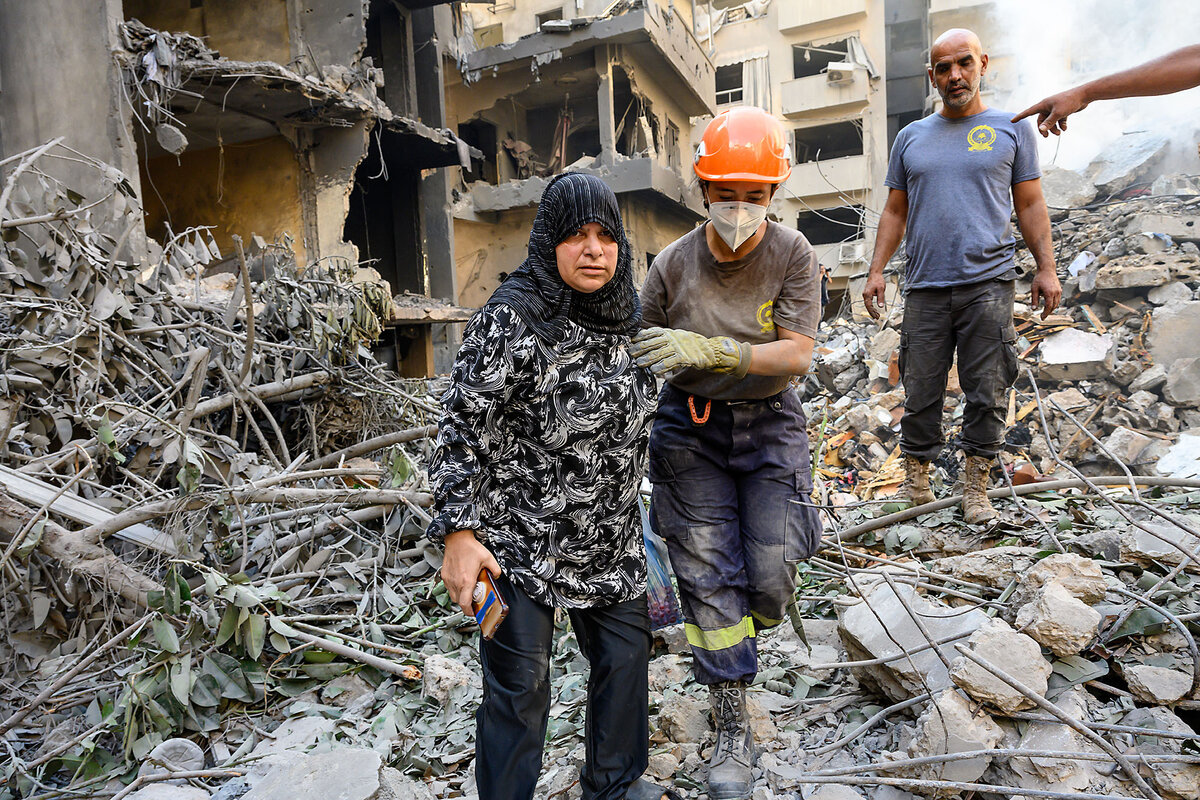In Lebanon, Hezbollah pays high political cost for its war with Israel
Loading...
| DEIR BILLA and BEIRUT, Lebanon
Iran-backed Hezbollah has wielded immense military and political power in Lebanon, presenting itself as the defender of Lebanese sovereignty. But it has been substantially weakened by Israel, and the war’s destruction has afflicted every Lebanese sect.
“There is a rising tide of anger [against Hezbollah] among Shias, but also amongst the broader Lebanese social fabric,” says Maha Yahya, director of the Carnegie Middle East Center in Beirut.
Why We Wrote This
In times of peace, Lebanon’s stability depends on a frail political balance. Now for many Lebanese enduring a punishing war with Israel, Hezbollah’s unique status as a heavily armed state-within-a-state is increasingly a problem.
Days after Israel struck a Shiite enclave in the northern town of Deir Billa, scattering shreds of $100 bills, a Christian resident who gave the name Samir voiced suspicions of Hezbollah’s local aims.
“My concern is why they have guns in our areas,” he says. “It’s far away from Israel and the border. ... Those weapons give power over us.”
Makram Rabah, an assistant professor at the American University of Beirut, says Hezbollah’s endurance requires broad grassroots support.
“Hezbollah’s supernarrative is that they have the ability to defend Lebanon, and defend the Shiites, and ultimately liberate Palestine. None of these credos have been effective,” he says. “You have 1.3 million displaced people who will never go back unless Hezbollah disarms. We won’t give them money this time to turn our villages again into bunkers and into ammunition depots.”
Usually far from the war’s front lines, the Christian residents of this quiet mountain village in northern Lebanon are still traumatized by the Oct. 12 blast that turned two houses to rubble in a tiny Shiite enclave in their midst.
The targeted Israeli strike, which reportedly killed three people, shook the hillside like an earthquake – and produced a cloud of shredded bits of $100 bills that witnesses suggest may have been a Hezbollah stash of cash.
The incident, which deepened Lebanon’s sectarian divide, underscored the increasingly high political cost paid by Iran-backed Hezbollah for its destructive war with Israel.
Why We Wrote This
In times of peace, Lebanon’s stability depends on a frail political balance. Now for many Lebanese enduring a punishing war with Israel, Hezbollah’s unique status as a heavily armed state-within-a-state is increasingly a problem.
Hezbollah has wielded immense power in Lebanon for decades. But it has been substantially weakened by a string of shocks from Israel, ranging from exploding pagers that wounded thousands of its operatives to airstrikes that killed 20 of its top leaders and commanders.
Thousands of airstrikes have targeted its missile arsenal and even its banking system, and a ground incursion has revealed networks of tunnels near Israel’s border. As a result, swaths of territory have been demolished, afflicting every Lebanese sect.
“There is a rising tide of anger [against Hezbollah] among Shias, but also amongst the broader Lebanese social fabric,” says Maha Yahya, director of the Carnegie Middle East Center in Beirut. “There is a lot of tension on the ground today, and the prospect of civil strife is quite high.”
“We have nothing to do with this war”
In Deir Billa the day after the strike, local Shiites swept debris off the road beside a small mosque. Roofs and walls of two homes across the narrow street were obliterated, their interiors exposed. Two men, including a Hezbollah civil defense worker, hung a Lebanese flag atop the rubble and retrieved a prayer rug with an image of Iran’s supreme leader, Ayatollah Ali Khamenei.
Traced in the powdery dust on the hood of a damaged car are the words in Arabic, “We are here for you, Nasrallah,” in reference to the Hezbollah chief assassinated by Israel in a series of explosions in Beirut in September.
Among the 1.3 million people displaced from Hezbollah strongholds in the south and east of the country, some Shiites have recently found their way to this community, making residents wary.
“We are a peaceful village, but when strangers come, refugees – we don’t know them – then trouble starts,” says Toni, a Christian whose family home sits a few hundred yards away from the two targeted buildings. “We have nothing to do with this war. ... So this was a shock to us.” He declined to give his family name.
“Trust me, before this happened, we were friends,” says Toni, speaking of his targeted Shiite neighbors. “There was nothing bad about the [Shiite] people who lived there for years, for 100 years. We are talking about the newcomers.”
Yet some residents voiced concern over what they say have been Hezbollah’s long-term aims in their community. “Our friends, they don’t show it, but they support [Hezbollah] in their hearts,” says another Christian, who gives the name Samir. “For a long time, Hezbollah is supporting them financially to make a base for them here, maybe to take over the area.
“We believe they had weapons here a while ago,” he adds. “My concern is why they have guns in our areas. It’s far away from Israel and the border. It’s against us [Christians]. Those weapons give power over us.”
Hezbollah’s unique status
In years past, Hezbollah enjoyed widespread popular support in Lebanon, often well beyond its Shiite base, for its self-declared role as the armed defender of Lebanese sovereignty. But in the past two decades, periodic resentment of the group has sharpened into more widespread hatred, owing to an increasing number of events linked to Hezbollah even before this hugely destructive war, which many Lebanese see as unnecessary.
Those include the 2005 assassination of popular Sunni Prime Minister Rafik Hariri; a costly all-out war with Israel in 2006; the use of force against political opponents and rival sects; and the massive 2020 Beirut port explosion, which killed more than 200 people and left hundreds of thousands homeless.
Hezbollah operatives also helped violently suppress the anti-corruption, anti-sectarian protests of the October 2019 revolution.
For Lebanese exhausted by chronic state failures and economic collapse, Hezbollah’s unique status as a heavily armed state-within-a-state is increasingly a key part of the problem, not of the solution.
Some now see the first chance in years of changing Lebanon’s internal political equation.
“What is visible to me is that other political parties in Lebanon are trying to capitalize on this, seeing this as an opportunity not only to undermine Hezbollah, but also to reassert their position within the political system,” says Carnegie’s Ms. Yahya. The party “still has 13 members of parliament, so the political framework, the political scaffolding is still there.”
Israeli Prime Minister Benjamin Netanyahu sought to deepen divisions on Oct. 8, warning Lebanese in a videotaped message to sideline Hezbollah or risk civil war.
“Christians, Druze, Muslims – Sunni and Shia – all of you are suffering because of Hezbollah’s futile war against Israel,” he said. “You have an opportunity to save Lebanon before it falls into the abyss of a long war that will lead to destruction and suffering like we see in Gaza,” Mr. Netanyahu said. “Stand up and take your country back.”
Lebanon’s political reckoning
While few Lebanese will heed any warning from the Israeli leader, it highlights the fragility of Hezbollah’s position.
“Hezbollah is destroyed not as a faction, but as an idea,” says Makram Rabah, an assistant professor of history and archaeology at the American University of Beirut. “Hezbollah’s supernarrative is that they have the ability to defend Lebanon, and defend the Shiites, and ultimately liberate Palestine. None of these credos have been effective.”
As long as Hezbollah keeps firing at Israel, “They can still claim that they have the capacity to fight,” he says. But Hezbollah has lost politically by forgetting its endurance requires grassroots support, beyond the Shiite community.
“People who were hesitant to take them on believed for some time that these [Hezbollah] weapons could defend Lebanon,” says Dr. Rabah. “Now they have proved that they could not even defend themselves.”
Yet while Hezbollah may be knocked off its pedestal, it continues to fire rockets and battle Israeli forces.
More and more Lebanese – like the Christians of Deir Billa, for instance, and many disillusioned Shiites – say the Lebanese army should be made strong enough to deploy all the way to the southern border.
Hezbollah “are trying to simply play out the clock, because they believe that they can win by points,” says Dr. Rabah. “It’s a David and Goliath thing. You don’t really need to defeat Goliath; you just need to sidestep him until something happens.”
It is not clear what that “something” may be, with U.S. President-elect Donald Trump likely to give Israel even more leeway than the Biden administration has to strike Hezbollah. But inside Lebanon, the political reckoning has begun.
“You have 1.3 million displaced people who will never go back unless Hezbollah disarms,” says Dr. Rabah. “We won’t give them money this time to turn our villages again into bunkers and into ammunition depots.”











